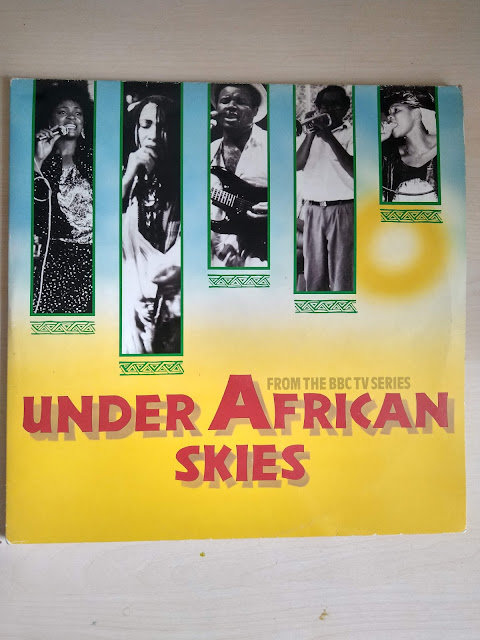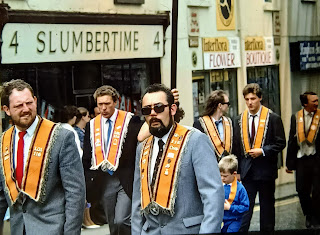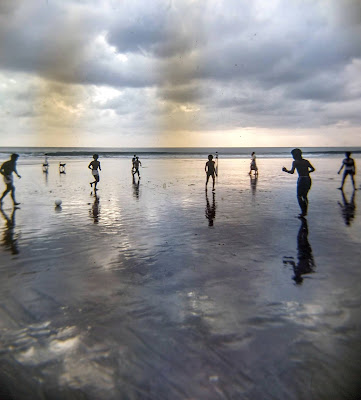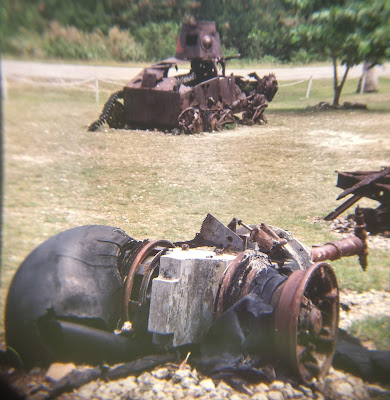Zaire (The Congo) - Under African Skies
Continuing my random selection of a box of slides from storage, next up is Zaire (now known as DRC, The Democratic Republic of The Congo), around 1988.
Under African Skies was a BBC2 series about the music of Africa.
The programme actually exists on YouTube, a very blurred scratchy version of it, dubbed from a Danish TV showing, https://www.youtube.com/watch?v=XBaUo7TtZxo.
There was also a BBC album:
That's one of my photos, top L.
'Kinshasa is Africa's undisputed musical heart,' says the The Culture Trip. Rumba, which developed into soukous, is impossible not to dance to. I remember a man in front of a stage whose movements were so fluid it looked like he was made of elastic. Artists in our film included Papa Wemba, Ray Lema, Franco, and Zaiko Langa Langa. We shot a memorable sequence with the stylish Sapeurs of Kinshasa, later picked up by The Face magazine.
Watching the film again (don't, it's just too blurry) reminded me that documentaries back then didn't rely on a celebrity presenter telling us about what he or she was seeing, eating and feeling. Instead, we relied on the residents to tell us what life in their country was all about. We'd get permissions to film on the arts ticket and then let the musicians and artists tell us, amongst everything else, about the politics and the human rights situations.
In Zaire, this was far riskier than usual. The ruthless dictator Mobutu was very much in power. Many innocent people were thrown in jail at the drop of a hat, including foreign journalists and aid workers. The pressures during our 2-week stay were relentless, just trying to get anything done was a massive uphill struggle. But what a worthwhile struggle. What music. What dance.
As production manager I was, as always, in charge of the money. Here, this meant carrying around enormous wads of cash in the local currency to pay the musicians, dancers, interviewees. Plus, everywhere we went, we had to give out bribes to officials. There were two versions of the 'police' I seem to remember, and you never knew which one you were dealing with. One lot were semi-official, the other lot were thugs posing as police.
We met many, many amazing people, but the feeling of hopelessness was never far away and fear of the authorities was always present. This was the only country I filmed in where we received protection from the British Embassy. Usually they would have nothing to do with us. But here, Ambassador Alistaire helped us every step of the way. Even inviting us to dinner with his family. There, at their compound, I was immediately transported into a Graham Greene novel: the conversation, the lush gardens hidden away from the chaos outside, the tinkle of the lawn sprinklers, the whomp whomp of the overhead fans, the talking parrot, the cane furniture, right down to the safari suit costumes... It had been many years since I'd read Greene, one of the first novelists I discovered at my local library when I progressed from child to teen member, but that atmosphere was instantly recogniseable.
The photos below show the Gungu tribal festival, hundreds of miles from Kinshasa on the Angolan border, one of the most unforgettable experiences ever. On our way down, we stayed at a boarding house. I went into total shock when, as we were sitting having our dinner, into the bar walked Alistaire and his security men.
 |
Unbeknownst to us, we were being protected. I had read Joseph Conrad's Heart of Darkness in preparation for this trip, and that's exactly what it felt like. I didn't sleep a wink. It's so sad that here we are decades later, the dreaded Mobutu long gone, but this beautiful, vast, country, full of natural resources and incredible music and dance, is still a dangerous, lawless, disaster zone.
 |
| Gungu festival |
 |
| Gungu festival |
When it was time to leave, I was still walking around like a bank robber with wads and wads of banknotes stuffed in my bag. I wasn't worried as I had a very large hotel bill to pay for everybody's rooms over the two weeks. But then I became very worried indeed when Reception politely pointed out to me that they didn't accept the local currency, only US dollars.
'But you have to,' I said in my limited French.
'Mais non madmoiselle...'
To my surprise, a torrent of French I never knew I had flowed from my mouth.
I broke into a cold sweat as the argument progressed, my French became increasingly fluent as the time for our flight to depart neared.
This money was completely worthless outside of the country. I don't think you were allowed to take it out anyway.
 |
Thankfully, the director kept his cool and called Ambassador Alistaire who drove over to take the currency from me and provide dollars in return. We made it to the airport in time.
Spontaneous applause from all the passengers broke out as soon as the plane wheels had left the tarmac. It was that difficult a place to be. And, sadly, I gather, still is today. Making music an even more important part of everyday life. We were there in 1988. Life expectancy in 2018 was recorded as 60 but the music always goes on.












When you first told me about this, especially the last part about the money, I thought it was a dream! But actually it was a nightmare!
ReplyDelete